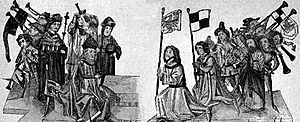Fiefdom facts for kids
A fiefdom (also called a fief or fee) was a special kind of property or right given by a powerful lord to a less powerful person, called a vassal. This was part of a system called feudalism, which was common in Europe during the Middle Ages. In return for the fiefdom, the vassal promised to be loyal and provide services, usually military help, to the lord.
A fiefdom wasn't always just land. It could be anything valuable. For example, it could be the right to hunt in a certain forest, the right to fish in a river, or even a political job. It could also be a monopoly, which means the only right to sell a certain product in an area. The person who received the fiefdom had the right to use it, but they had to follow certain rules and conditions set by their lord.
Contents
What Was Feudalism?
Feudalism was a way of organizing society in the Middle Ages. It was like a pyramid. At the top was the king. Below him were powerful lords, who were his vassals. These lords then had their own vassals, who were knights or lesser nobles. Each person in the system had duties to those above and below them.
How Fiefdoms Worked
When a lord gave a fiefdom to a vassal, it was a serious agreement. The vassal would promise loyalty and service, often by kneeling before the lord and swearing an oath. This was called an act of homage and fealty.
- Land for Service: The most common type of fiefdom was land. A lord would give a piece of land to a knight. In return, the knight promised to fight for the lord when needed. This meant providing soldiers, horses, and weapons.
- Inheritance: Over time, fiefdoms often became hereditary. This meant that when a vassal died, their oldest son could inherit the fiefdom. This made the system more stable.
- Other Rights: Besides land, a fiefdom could include other valuable rights. For example, a lord might grant a vassal the right to collect taxes from a village. Or, they might give the right to operate a mill, where everyone had to grind their grain.
Why Fiefdoms Were Important
Fiefdoms were very important for several reasons:
- Military Power: They helped lords and kings raise armies. Since there were no national armies like today, lords relied on their vassals to provide fighting men.
- Governing Land: Fiefdoms helped manage large areas of land. The lord didn't have to control every small village directly. Instead, his vassals managed their own fiefdoms, keeping order and collecting resources.
- Social Order: The system of fiefdoms created a clear social structure. Everyone knew their place and their duties. This helped keep society stable, even though there were often conflicts.
The End of Fiefdoms
The system of fiefdoms slowly changed over many centuries. As kings became more powerful and countries developed national armies, they relied less on vassals for military service. Money also became more important than land as a form of wealth. By the end of the Middle Ages, the feudal system and fiefdoms began to disappear, replaced by new ways of organizing society and government.
See also
- Vassal
- Feudalism
- Middle Ages
- Knight
- Lord
- Monopoly
- Homage and fealty
- Feudo para niños
 | Delilah Pierce |
 | Gordon Parks |
 | Augusta Savage |
 | Charles Ethan Porter |


